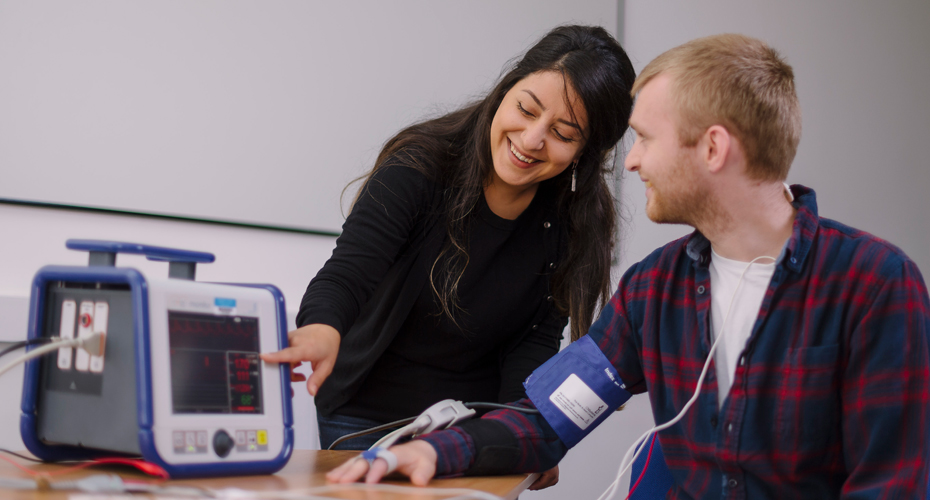| UCAS code | 1234 |
|---|---|
| Duration | 1 year full time 2 years part time |
| Entry year | 2024 |
| Campus | Streatham Campus |
| Discipline | Psychology |
| Contact |
| Typical offer | Normally a 2:1 Honours degree or equivalent in Psychology |
|---|---|
Overview
- This programme aims to equip you with an array of methodological skills to function as an effective PhD student or as a professional researcher in psychology, with a particular emphasis on cognitive, clinical, and clinical neuroscience research
- It can be applied for as a stand-alone degree or form the first year of a PhD
- Delivered as part of the ESRC South West Doctoral Training Partnership – a hub of world-class social science research
- Acquire the necessary skills to generate good research questions, establish plausible theoretical answers, and carry out high-quality empirical research in order to test your hypotheses
- Complete a research project that makes a contribution to the discipline, and gives you necessary skills and confidence to be able to operate independently in the future
![]()
Top 100 in the world for Psychology
QS World University Rankings 2024
![]()
11th in the UK for internationally excellent research in Psychology
REF 2021 based on 4* and 3* research, submitted to UoA4 Psychology, Psychiatry and Neuroscience
![]()
Top 10 in the UK for Psychology
9th (joint) in the Guardian University Guide 2024
![]()
Extensive research facilities including eye tracking, EEG/ERP and TMS laboratories, audio-visual recording suite and MRI scanner
Entry requirements
Normally a 2:1 Honours degree or equivalent in Psychology. A degree in another discipline may be accepted if it included substantial content in Psychology, research methodology and statistics.
Entry requirements for international students
English language requirements
International students need to show they have the required level of English language to study this course. The required test scores for this course fall under Profile B2. Please visit our English language requirements page to view the required test scores and equivalencies from your country.
Course content
This programme consists of compulsory taught modules and a substantial research project. It will acquaint you with a wide range of data analysis techniques and research methods in the areas of clinical neuroscience, and both clinical and cognitive psychology, while enabling you to develop particular specialist skills and knowledge in selected areas.
You will be able to get involved with one or more of the research groups in the department to explore your research interests further.
The modules we outline here provide examples of what you can expect to learn on this degree course based on recent academic teaching. The precise modules available to you in future years may vary depending on staff availability and research interests, new topics of study, timetabling and student demand.
My favourite aspect of the programme is how research centred it is. Lectures are given by researchers who are experts in the topics they are teaching, and as part of the research project component of the course, you have the opportunity to be part of the research team and conduct high-quality research of your own.
Brontë
MSc Psychological Research Methods
Research apprenticeship
A distinctive feature of all our taught Masters programmes is the Research apprenticeship. The apprenticeship enables you to develop your research skills by working alongside experienced researchers or practitioners. You will also gain experience in scientific communication through the process of writing up your research in the form of a dissertation.
Many students undertake their apprenticeship with researchers in our Psychology department, but apprenticeship opportunities may also be available outside the University. A broad range of projects are typically available each year and may cover a diverse array of topics.
Examples of previous research project topics:
- cognitive psychology
- cognitive neuroscience
- clinical neuroscience
- clinical neuropsychology
- social psychology
- environmental psychology
- applied psychology
- epidemiology
- sports psychology
Examples of previous research projects
Topics include:
- Social behaviour,
- animal welfare and enrichment,
- zoo research,
- animal cognition,
- navigation,
- sensory ecology,
- behavioural and evolutionary ecology,
- ecotoxicology.
Animals include:
- Fish (guppies, sticklebacks, killifish),
- mammals (primates, squirrels, whales, donkeys, dogs, meerkats, coyotes),
- birds (pigeons, chickens, pheasants, magpies, flamingoes, woodland and sea birds),
- invertebrates (crabs, honeybees, bumblebees, desert ants, wood ants).
Locations include:
- Streatham Campus (Exeter),
- Knysna Elephant Park (South Africa),
- Bristol Zoo,
- Budongo Forest (Uganda),
- Torquay Zoo & Aquarium,
- National Wildlife Research Center (Utah, USA),
- Dartmoor (Devon),
- Phana (Thailand),
- Trinidad,
- Newquay & Paignton Zoos,
- Slimbridge Wetland Centre, Kerala (India),
- Algarve (Portugal),
- Veracruz (Mexico),
- Cayo Santiago (Puerto Rico).
External research partners include:
- African Elephant Research Unit (South Africa),
- Bristol Zoo,
- Budongo Conservation Field Station (Uganda),
- Living Coasts (Torquay, Devon),
- National Wildlife Research Center (Utah, USA),
- Natural England,
- Phana Macaque Sanctuary (Thailand),
- University of West Indies,
- Whitley Wildlife Trust,
- Wildfowl & Wetlands Trust.
Fees
2024/25 entry
UK fees per year:
£14,300 full-time; £7,150 part-time
International fees per year:
£29,700 full-time; £14,850 part-time
Scholarships
We invest heavily in scholarships for talented prospective Masters students. This includes over £5 million in scholarships for international students, such as our Global Excellence Scholarships*.
For more information on scholarships, please visit our scholarships and bursaries page.
*Selected programmes only. Please see the Terms and Conditions for each scheme for further details.
Teaching and research

How you'll learn
- Lectures
- Seminars
- Research talks
- Discussion sessions with researchers
- Practical sessions
Learning from experts
Our staff are recognised internationally for their academic excellence, high-quality research and applied output. They actively research the areas of psychology they teach, so their expertise feeds directly into our research-led programmes.
Facilities
Throughout your study you will use a range of innovative teaching facilities, such as an online learning platform, various 24/7 computer pools and audio-visual suite, 24/7 library, study spaces, animal labs and specialised equipment. There are also extensive research facilities including eye tracking, EEG/ERP and TMS laboratories, audio-visual recording suite and an MRI scanner.
Tutorial support
Each student is allocated a personal tutor who is available for advice and support throughout your studies. There is also a postgraduate tutor available to help with further guidance and advice.
Assessment
Advanced statistics modules are assessed by written examination plus a small component of coursework. Other taught modules are assessed by coursework, while the research project requires you to prepare either a dissertation or a research paper ready for submission to a journal.
There are two aspects of our programme that distinguish it from other MSc programmes focused on psychological and neuroscientific methods. First, we go to great lengths to ensure that each student can shape the set of methods and skills they acquire thus creating their own bespoke curriculum.
This approach permeates every element of the programme - from assessments where students decide on the topic, to the substantial set of hands-on workshops on a variety methodologies employed in Psychology, to the vast choice of ~30-40 research project topics offered by ~20 supervisors.
Second, our very comprehensive research project (which we refer to as "research apprenticeship") enables students to acquire a specific methodology at a level of sophistication that goes far beyond any taught course or workshop.
Read more from Professor Aureliu Lavric
Professor Aureliu Lavric
Programme Director and Associate Professor
Careers

Employer-valued skills this course develops
On completion of your postgraduate degree you will have the scientific skills to enable progression into research or professional psychology, the communication skills required for marketing and business roles, and the interpersonal skills needed for progression into personnel or caring professions.
Exeter’s reputation amongst graduate employers has helped postgraduates into successful careers in research, high technology industries, management, personnel, legal and advertising services amongst others.
Careers services
Our careers teams at the Career Zone can help guide you through a wealth of information to match your skills and interests to a career that will suit you. Our staff work with regional, national and international employers to develop new work placement, project and graduate opportunities.
Recent graduates
Below are a few examples of initial jobs undertaken by graduates of our Psychology Masters programmes. This information has been taken from the Destinations of Leavers from Higher Education (DLHE) Survey 2016/17. Please note that, due to data protection concerns, the job titles and organisations are listed independently and do not necessarily correspond.
Recent graduates are now working as:
- Dietetic Support Worker
- High school counsellor
- Independent Researcher
- Lab Assistant
- Lemur Trust Wildlife and Technology Trainee
- Product developer
- Rehoming and Welfare Assistant
- Research Assistant
- Trainee Psychological Wellbeing Practitioner
- Writer
Recent graduates are now working for:
- Alexander Care
- AseraCare Hospice
- CAMHS Urgent Help Service
- Cardiff University
- Cardigan Bay Marine Wildlife Centre
- CIRCLE/Flamingo Land
- Devon Autism and ADHE Service
- Mercedes Benz
- Shanghai Foreign Service Co. Ltd.
- The Wellcome Trust
- University of Exeter Medical School
Further study
Further study is a popular choice for a number of students following graduation from our Masters programmes. Below are a few examples of further study undertaken by recent graduates of our Psychology Masters programmes. This information has been taken from the Destinations of Leavers from Higher Education (DLHE) Survey 2016/17.
- PhD Psychology
- Master of Applied Psychology
- MPH Psychology
- PhD Medical Studies
- PhD in Psychology











